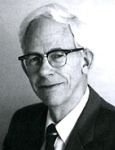In Memoriam: C. Alan Anderson, 1930–2012
 C. Alan Anderson, an AAR member from 1987–2003, passed away on November 25, 2012, from complications following surgery for a fractured hip suffered in a fall.Anderson received his BA from American International College in 1952, an LLB (later converted to JD) from the University of Connecticut School of Law in 1955, and an MA from the University of Connecticut in 1957. Anderson earned his PhD in philosophy, particularly in New Thought, at Boston University in 1963. He created what he came to call Process New Thought, which amalgamated the Bible-based Christian taproots of mid-nineteenth century Universalism embraced by Quimby with the upbeat, positive practices of New Thought and the updated idealism of process thought. C. Alan Anderson, an AAR member from 1987–2003, passed away on November 25, 2012, from complications following surgery for a fractured hip suffered in a fall.Anderson received his BA from American International College in 1952, an LLB (later converted to JD) from the University of Connecticut School of Law in 1955, and an MA from the University of Connecticut in 1957. Anderson earned his PhD in philosophy, particularly in New Thought, at Boston University in 1963. He created what he came to call Process New Thought, which amalgamated the Bible-based Christian taproots of mid-nineteenth century Universalism embraced by Quimby with the upbeat, positive practices of New Thought and the updated idealism of process thought.
After teaching history and philosophy at Babson College for a few years, Alan spent thirty-four years as professor of philosophy and religion at Curry College in Milton, Massachusetts, where he was instrumental in helping it earn its accreditation. Publications by Anderson include The Problem is God (Stillpoint, 1985); and two books jointly authored with his wife, New Thought: A Practical American Spirituality (Crossroad, 1995) and Practicing the Presence of God for Practical Purposes (Author House, 2000). He also authored numerous pamphlets and monographs.
Charles W. Fox Named President of Tillich Society
Charles W. Fox, an AAR member since 1989, was elected president of the North American Paul Tillich Society at the recent meetings of the American Academy of Religion and the Tillich Society in Chicago. Fox will serve a three-year term.
The Tillich Society was founded to honor and extend the theological and philosophical work of Paul Tillich, considered one of the two or three greatest theologians of the twentieth century. In later life, Tillich became a professor at Harvard University, where Fox had the opportunity to work closely with him as one of his teaching assistants.
Fox received his doctorate in philosophy of religion from Harvard University, and he subsequently taught at Williams College and the State University of New York until his retirement.
|

